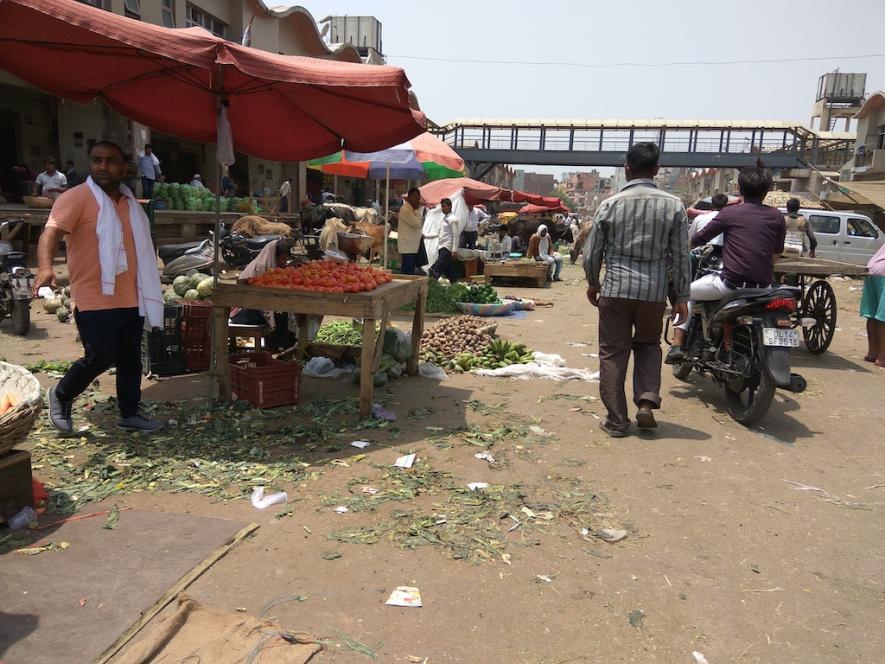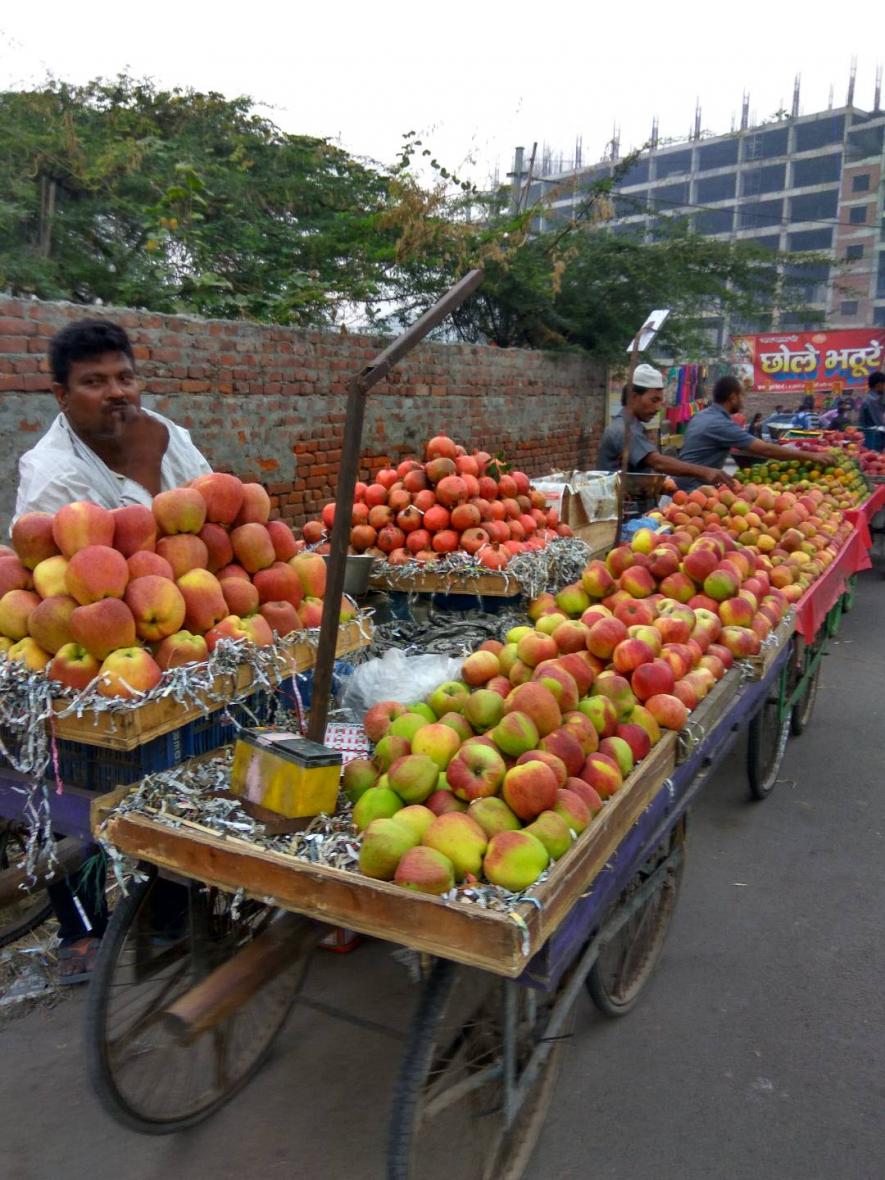Is This the Right Time to Close Down APMC Mandis Sans Consulting All Stakeholders?

Village Mall near Wipro Guest House in Bangalore/Shambhu Ghatak
In the past one week or so, experts have written about dismantling the monopsony power of the Agricultural Produce Marketing Committee (APMC) markets -- in short, APMC mandis. Two articles, one written in Financial Express, dated March 27, 2020, and another in The Hindu Business Line, dated March 30, 2020 deserve our immediate attention (including the attention of key stakeholders) for further public discussion and debate.
Some of the arguments that have been put forth by those who want to end the monopoly power (actually a misnomer; monopsony is the appropriate word) of the APMC mandis that mainly operate for trading in foodgrains, vegetables and fruits, are as follows:
1. Direct selling by farmers or producers to corporate entities in the food retail business, individual customers, Farmer Producer Organisations (FPOs), self-help groups (SHGs), cooperatives, etc. would give a higher mark-up to the former in prices charged against the commodities sold or traded. This is because the middle agents (like arhtiyas) would be eliminated in the agri-trade under the newly conceived system.
2. In a situation like this, when APMC mandis are not operating at their full capacity, their exclusive rights on agriculture produce marketing needs to be curtailed. Suspension of APMC provisions would bring down the transaction cost since mandi fees won't be charged anymore. This is expected to benefit the retailers, including the end customers.
3. Online trading by agents (like small & medium enterprises, FPOs, cooperatives, Self Help Groups, cooperatives etc.) using the e-NAM platform for procurement of farmers’ produce, has to be promoted at a time when most APMC mandis are not operating at their full capacity.
4. Since social distancing (physical distancing is a much better term though) is required to contain the fast spreading of COVID-19, it would be better if the APMC mandis, where agents congregate to do trading, discontinue. It would be beneficial if the stakeholders adopt and adapt to the technological disruption that is happening around.
5. The Essential Commodities Act (ECA) should be withdrawn pertaining to staples so that big businesses, processors, retailers and others could hold bulk stocks over the present prescribed limits.
6. Instead of depending on commission agents, if aggregation is done by the FPOs and quality check is guaranteed by the APMC mandis, then footfalls in APMC mandis could be reduced to a great extent and social distancing could be ensured, provided the e-NAM platform is adapted wholeheartedly by the states.
7. Bypassing the commission agents (viz. arhtiyas) system -- a so-called powerful lobby that operates in APMC mandis -- and replacing it with the online trading system (where big corporates play a key role in procurement from FPOs) is expected to promote fair trade, enhance competition, reduce monopsony power of APMCs and encourage private investment, benefiting not just the farmers but also the end consumers.
Personal experience is as valuable as the knowledge that experts share in academic meetings, conferences, books, articles, newspaper columns, etc. This has been well-illustrated in one of economist Jean Drèze's article entitled 'Evidence, policy, and politics' (August 3, 2018). So, let me share my personal experience first.

Ghazipur Vegetable Mandi near Anand Vihar-Kaushambi/Shambhu Ghatak
The Ghazipur Mandi
The Ghazipur vegetable mandi near Anand Vihar-Kaushambi (popularly known as 'sabzi mandi' among the villagers of Bhowapur) is situated at a stone’s throw away from my residence. In normal times, the mandi opens at 5.00-5.30 a.m. The hustle and bustle of the mandi can be clearly heard even if one is half-asleep during the wee hours.
Vegetable vendors of various purse sizes, from both Delhi and Ghaziabad (Uttar Pradesh), buy their daily requirement of vegetables (including dairy products, like paneer and frozen vegetables, like green peas, apart from vanaspati, ghee, etc.) from the Ghazipur mandi.
Small retail sellers, i.e., those who sell vegetables on carts to final customers, also make their purchases from this mandi. These retailers don’t have the capital and technical know-how to make purchases from big corporates like ITC, Britannia, Nestle, BigBasket, Cargill India, Patanjali and Adani Group. After all, the digital divide is a reality in the country, which cannot be ignored. Cash transaction is quite rampant in Ghazipur sabzi mandi.
In cities such as Delhi NCR (including Ghaziabad and Noida), vegetable vendors as a community are key stakeholders in the food supply chain. However, they are quite comfortably forgotten or ignored when experts share their policy prescription to reform the existing supply chain management.

Fruit and vegetable vendors at Shukra Bazaar (Friday haat) at Kaushambi/Shambhu Ghatak
Though street vendors have a limited capital for daily purchases, they know the supply-demand equation quite well. Due to their regular interaction with people from particular housing societies/locations, they have a sound knowledge of the quality and quantity of the commodities to be bought and sold to suit everyone's daily needs.
They don't buy in bulk, since they don't have any storage facility and also because they don't have the required capital to rent such a facility. However, vegetables sold by street vendors is fresh (vis-à-vis what we get at big stores) and fulfil the nutritional requirement of middle-class consumers.
Home Delivery
After the announcement of coronavirus of COVID-19 lockdown on March 24, 2020, vegetables and fruits have become unavailable for home delivery at Big Bazaar in East Delhi Mall (EDM), which is situated near my residence. Between March 29 and April 1, 2020, EDM was closed down. It opened on April 1, evening.
Another player, Big Basket, has been unable to provide home delivery slots to customers. Only Big Basket Daily is able to make daily milk supply in morning at the doorsteps. However, one needs to use a smartphone for downloading the BB Daily App first and then do prepaid recharging for getting milk supply at doorsteps.
Although a list of grocery (kirana shops) and vegetable/fruit shops for home delivery via telephone call/WhatsApp has been circulated among apartment owner associations (AoAs) and resident welfare associations (RWAs) in places like Kaushambi, Vaishali, Indirapuram and Vasundhara in Ghaziabad, most of the phones lines remain busy due to rush and panic buying.
Only a handful of big stores in the retail business are doing the home deliveries, as per the list circulated among the AoAs and RWAs, and no one knows how these handful were chosen. Most mom-and-pop grocery stores have been closed down due to the fear of coronavirus as also of the administration.
Home delivery of grocery items, as well as fruits and vegetables, by big stores is only made when payment is made online via Net banking or Pay TM. One has to make a minimum amount of purchase to ensure home delivery. Otherwise, home delivery won’t be made by the stores. Consumers who have a small family or those who don’t have enough purchasing power, like the villagers of Bhowapur, can’t rely on the big stores for delivery at their doorsteps.
Due to the inability of most big stores to supply vegetables and fruits at doorsteps, people’s dependence on vegetable vendors has increased in this crisis time. However, cart vendors also face the wrath of the police and administration when they are seen on streets during the lockdown period. Residents of societies generally ask street vendors for home delivery of vegetables and fruits if the former have their phone numbers, though the price charged is a bit higher than the normal times, which is affordable for the middle class.
A situation like this can cause price rise, particularly for food and other essential commodities. Take, for example, the rate list, which has been provided to customers in Kaushambi, Vaishali, Indirapuram and Vasundhara in Ghaziabad by MKC Agro Fresh Limited – a retailer in the list given to AoAs and RWAs. For the period March 28-30, the brinjal rate was Rs. 40 per kg. However, for the period April 1-4, this rate rose to Rs. 60 per kg. The minimum amount of purchase to be made for home delivery is Rs. 600. They prefer payment by Pay TM.
It should be added here that most big stores who have retail chains across the country have failed miserably to home deliver items during the lockdown. The poor street vendors, who take the risk of going to the APMC mandis to purchase vegetables and fruits, are still preferred over big stores by most consumers in Delhi NCR.
APMC Dismantling & Lockdown
Let me now refute some of the points that have been argued in favour of dismantling the APMC mandis. Although there is no guarantee that farmers will get a remunerative price, which is greater than the minimum support price (MSP) declared by the Commission for Agricultural Costs and Prices (CACP), for selling the farm produce in APMC mandis, the same might hold true if s/he sells the produce to FPOs or some big company via e-NAM. Clearly, farmers are exposed to market price fluctuations under both the systems (with the exception of forward/ futures markets).
Since India is a democracy, all key stakeholders need to be consulted first before diluting the APMC provisions, including arhtiyas, loaders, cleaners, drivers, small, medium & large retailers, consumers, etc. Due to the policy of social or physical distancing that is being implemented in the form of lockdown, such consultations are not possible at this juncture.
In a federal set-up, states need to be consulted and taken into confidence first. We are already seeing how the exodus of migrant and informal workers is taking place because of the sudden and unplanned implementation of lockdown without any proper consultation with key stakeholders.
One should not forget that the country is passing through economic slowdown. Large-scale unemployment of manual workers employed in the mandis and other agents in the existing food supply chain could adversely impact the overall effective demand in the economy, thus, causing further economic devastation. Replacing one set of manual workers (including licensed hamals and cart men) with another set (like MGNREGA -rural job guarantee scheme --workers) makes no sense if the existing commission agents-based system is replaced by a corporate powered, decentralised agri-produce marketing system. The new system, which the experts desire for, may be capital-intensive in nature and deploy technology at the cost of contraction of jobs meant for blue-collar workers, especially.
If one set of monopsony players (like the APMC mandis) is replaced by another set of players (like some corporate entity or some FPOs), who behave like the former later, then the suggested reform measure to be undertaken could become futile. After all, the history of capitalism tells us how it passed through various stages – from competitive to monopoly and finance capitalism.
If we look at everything from the framework of political economy, then we need to understand the economic interest behind every agent’s market behaviour. A disclaimer at the end of an opinion writer’s piece is a must to know whether that person has any vested interest for promoting an idea for policy formulation. Thus, we need to clearly know who are the people asking for reforms in the APMC structure and how much they stand to gain from it.
The writer is Senior Associate Fellow, Inclusive Media for Change, Common Cause. The views are personal.
Get the latest reports & analysis with people's perspective on Protests, movements & deep analytical videos, discussions of the current affairs in your Telegram app. Subscribe to NewsClick's Telegram channel & get Real-Time updates on stories, as they get published on our website.
























